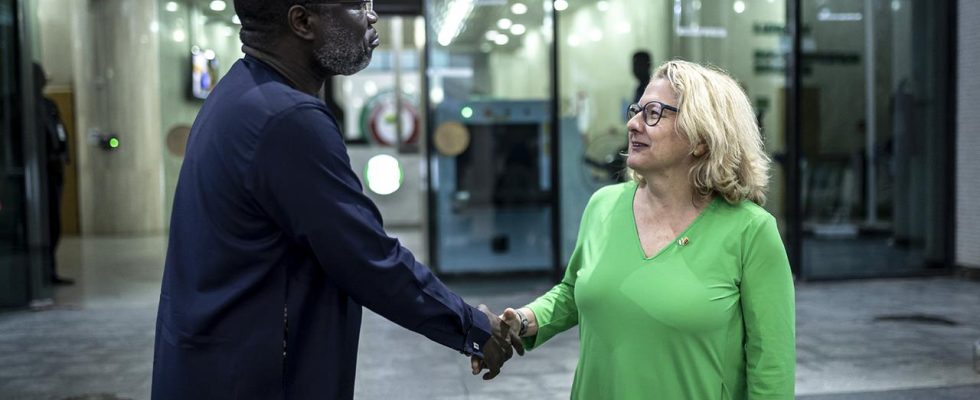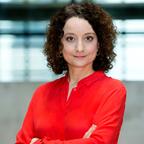analysis
Minister Schulze was in the Sahel for four days. The crisis in Niger is worrying many in the region. Germany wants to use aid money as leverage in negotiations with the putschists – can that work?
The fish sellers at the port of Nouakschott have everything prepared. You know that visitors are coming from Germany. There are full baskets and crates with the fresh catch everywhere. There is a dense crowd. When Federal Development Minister Svenja Schulze arrives, a crowd of fish sellers quickly gathers around her.
According to some of them here, Germany has helped to improve their situation. There are now boxes in which the fish can be transported and sold clean. And the fish sellers have learned to market it. Lalla Souleymane is also grateful to the German Development Minister for this. Even if she complains that there is still a lot to do. “A lot is missing,” says the energetic Mauritanian. “Such as cold rooms or freezers.” Then she could sell the fresh catch even better.
Schulze’s mantra: create jobs and prospects
Creating jobs is one of the major goals that the development minister is pursuing in the Sahel. In a region where the majority of the population is under 25 years old, she wants to help create perspectives. A particular focus is on rural areas. “I’ll be happy if we manage to make things a little more stable. That local structures will emerge, a local government that will build water pipes, that will take care of health care. That’s the epicenter of terrorism here, but the terrorists don’t build anything here water pipes,” says Schulze.
Development Minister Schulze in conversation with workers in the Cassanovas factory in Nigeria’s capital Abuja, where chips are made from cassava
The fact that terror and extremist groups are continuing to spread causes great concern in the region. Even more so now that the putschists are in power in Niger. “We now have to stick together as Sahel countries and continue to intensify the dialogue, including with Niger,” said Mauritanian Economics Minister Abdesselam Saleh when he appeared with Schulze in front of the press. And the Development Minister is also hoping for dialogue.
Aid should be tied to a peaceful transfer of power
After Mauritania, she therefore travels to Nigeria, the seat of ECOWAS, the West African Economic Community. When Schulze lands, everything has to happen very quickly. ECOWAS politicians are in high demand these days. They try to negotiate with the putschists in Niger and at the same time make it clear that they are ready for military intervention. Schulze arrives as President of the Sahel Alliance. An alliance of 18 countries that coordinates development cooperation to be more effective.
Since the military coup, the countries of the Sahel Alliance have frozen funds for development cooperation in Niger – Germany’s projects have also been put on hold. The President of ECOWAS, Omar Touray, thanked Schulze for this during the talks. “But he also demanded that we continue to show solidarity because the pressure has to be maintained now. That’s something I also promised,” says Schulze.
What she means: Germany and other donor countries want to use the aid payments as leverage. If ECOWAS and the African Union negotiate with the putschists from Niger, the funds can also be linked to a peaceful transfer of power. Money against peace and return to democracy – can that work? Karina Mross from the German Institute of Development and Sustainability (IDOS) is convinced that there can be a pound at the negotiating table. “About 40 percent of Niger’s national budget comes from international donors. The new rulers will certainly feel the effects of that.” Is the strategy working? Mross also sees the danger that the putschists will look for other countries to cooperate in order to fill the financial gap.
cooperations take place development cooperation?
The Africa scholar Robert Kappel is not convinced of the German Development Minister’s strategy. He calls for a fundamental rethink. According to the professor at the University of Leipzig, billions of euros in international funds have flowed into the Sahel and seeped away in recent years. It is time for a rethink, away from the issue of poverty reduction towards economic cooperation. “We need investments in technology, industrial cooperation. As much as I welcome the fact that Fischer is supported, cooperation with companies is crucial in order to create the jobs of the future.” Time is running out, because China has been here for a long time. The global power shift is particularly evident in the Sahel.
Schulze is convinced that her concept is the right one. Again and again you will be reflected back from the region. “We have an interest in being really good partners. Now we’re doing it out of a feeling that we’re the stronger ones. But this is a fast-growing innovative region. If we want to work with this region in the future, it’s today important to do this in partnership.” With her trip, she also wants to send a symbolic signal: Germany is there as a partner even in difficult times.


